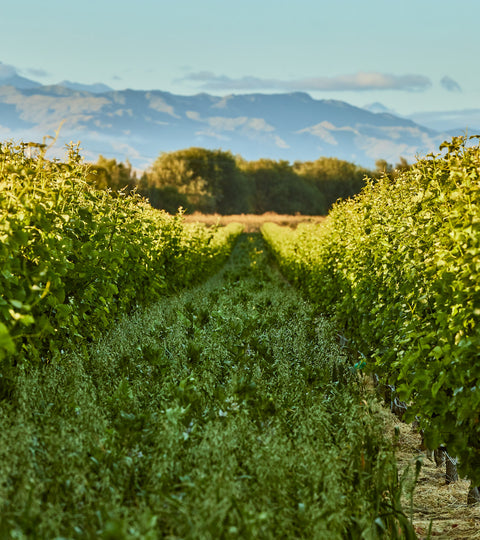Winter is a critical time of year for us in the vineyards, as its when some major work programmes happen to set the vines up for a fantastic growing season once spring hits.
So, this blog post covers what is our team getting up to in the vines during winter, and shares some insight from our vineyard manager Gareth Exton on how we use sustainable practices to look after the soil health and the environment.
Pruning and mulching:
Pruning canes from our vines after they are harvested and going dormant is one of the single most important actions we can take to set them up for a productive and concentrated growing season for the 2020/2021 calendar. Why is winter pruning so important? Well, pruning off the excess canes and leaving just four canes on the vines allows us to tell the vines how many bunches of fruit we want it to produce. Being selective about how much fruit your vines produce is critical, as too much fruit left on the vines will result in less ripe, less concentrated grapes - and we don't want that!
When we've selected the canes we want to grow next year, the remaining unwanted canes are cut, and put into the middle of the rows (where the grass grows) and then a machine comes over the top and 'mulches' the pruned canes, chopping and cutting them into smaller pieces, that then break down into the soil.
This action helps with soil regeneration by keeping the nutrients from the vines on our lands, and is a much more sustainably-friendly option than burning the old cuttings (which is a more common practice in European grape-growing regions). Mulching the canes into the inter-rows and not directly under the vines also assists with mitigating / limiting disease pressure. We have around 1300 kilometres (over 800 miles) of vineyard row length to cover, so that's a lot of mulch, and a lot of soil that gets regenerated through this practice!
Winter sheep grazing:
We love nature's lawn mowers! During the winter season, we engage with local farmers and open our gates to some cute woolly friends to help out with lawn mowing and weed control. Around 3,000 sheep are currently grazing our vineyards, which not only supports the local industry by creating paddocks to feed their stock, but there's also a range of unexpected sustainability benefits too!
Sheep, as a natural lawn mower, have a lower impact on the soil, which means the soil is less compacted over this time. This gives the soil a much-needed break from the heavy harvest machinery and mowers that we have to use at other times of the year. So, sheep definitely help us by reducing soil compaction.
The presence of sheep in the vineyards at winter time also assists in soil health and regeneration, by creating and adding carbon and potassium-rich matter (manure) back to the soil. This acts as a natural, slow release fertiliser for the land.
Cover crops:
Mulching the pruned vines into the inter-rows isn't just beneficial for soil health - it's also great as an additional source of nutrients for our cover crops.
Cover crops are 'non cash crop' plants, flowers, and sometimes edible crops, that are planted inter-row to support soil vitality, encourage good insects that perform biological controls on insect pests, and increase biodiversity in the vineyard.
In our previous 2019/2020 growing season we planted peas, beans, and oats as our inter-row cover crop, and they worked a treat. We even had a surprise crop of delicious little snow peas to eat when they sprouted just before Christmas at our home vineyard! For the 2020/2021 season, we have just seeded an exciting new plant mix including broad red clover, strawberry clover, Huia clover, chicory, Phacelia, Plantain, Sheep's Burnett, Wairau Lucerne, and common vetch.

